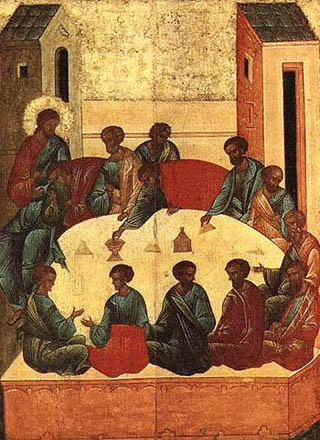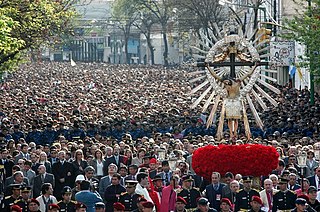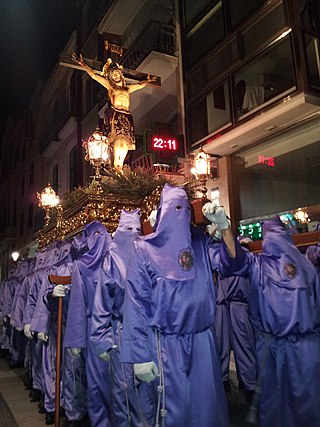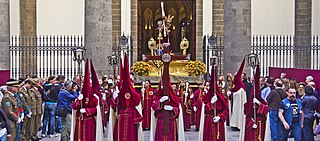
Palm Sunday is a Christian moveable feast that falls on the Sunday before Easter. The feast commemorates Christ's triumphal entry into Jerusalem, an event mentioned in each of the four canonical Gospels. Palm Sunday marks the first day of Holy Week. For adherents of mainstream Christianity, it is the last week of the Christian solemn season of Lent that precedes the arrival of Eastertide.

Great Lent, or the Great Fast, is the most important fasting season of the church year within many denominations of Eastern Christianity. It is intended to prepare Christians for the greatest feast of the church year, Pascha (Easter).

Good Friday is a Christian holiday commemorating the crucifixion of Jesus and his death at Calvary. It is observed during Holy Week as part of the Paschal Triduum. It is also known as Holy Friday, Great Friday, Great and Holy Friday, and Black Friday.

Ash Wednesday is a holy day of prayer and fasting in many Western Christian denominations. It is preceded by Shrove Tuesday and falls on the first day of Lent. It is observed by Catholics in the Roman Rite, Lutherans, Moravians, Anglicans, Methodists, Nazarenes, as well as by some churches in the Reformed tradition.

Maundy Thursday or Holy Thursday is the day during Holy Week that commemorates the Washing of the Feet (Maundy) and Last Supper of Jesus Christ with the Apostles, as described in the canonical gospels.

Holy Week is the most sacred week in the liturgical year in Christianity. In Eastern Churches, which includes Eastern Orthodox, Eastern Catholic and Eastern Lutheran traditions, Holy Week occurs the week after Lazarus Saturday and starts on the evening of Palm Sunday. In the denominations of the Western Christianity, which includes the Roman Catholicism, Lutheranism, Moravianism, Anglicanism, Methodism and Reformed Christianity, it begins with Palm Sunday and concludes on Easter Sunday. For all Christian traditions it is a moveable observance. In Eastern Rite Churches, Holy Week starts after 40 days of Lent and two transitional days, namely Saturday of Lazarus and Palm Sunday. In the Western Christian Churches, Holy Week falls on the last week of Lent or Sixth Lent Week.

Bulacan, officially the Province of Bulacan, is a province in the Philippines located in the Central Luzon region. Its capital is the city of Malolos. Bulacan was established on August 15, 1578, and part of the Metro Luzon Urban Beltway Super Region.

The Paschal Triduum or Easter Triduum, Holy Triduum, or the Three Days, is the period of three days that begins with the liturgy on the evening of Maundy Thursday, reaches its high point in the Easter Vigil, and closes with evening prayer on Easter Sunday. It is a moveable observance recalling the Passion, Crucifixion, Death, burial, and Resurrection of Jesus, as portrayed in the canonical Gospels.

A Holy Week procession is a public ritual march of clergy and penitents which takes place during Holy Week in Christian countries, especially those with a Catholic culture. Various images of the saints, especially the Virgin Mary, and most importantly the image of the crucified Christ are carried aloft by foot on shoulder-borne pasos as an act of penance; acts of mortification are carried out; traditional Christian hymns and chants are sung. In many confraternities of penitents, the faces of the members are covered by elaborate hoods, such as the capirote, as a way of hiding one's identity in order to not ostentatiously draw attention to oneself while performing penance. Crosses, and biers holding Catholic holy images surrounded with flowers and offerings of candles, are carried usually from one parish church to another led by the clergy, monastic orders, or heads of the penitential orders.

In Christianity, Holy Wednesday commemorates the Bargain of Judas as a clandestine spy among the disciples. It is also called Spy Wednesday, or Good Wednesday, and Great and Holy Wednesday.

Baliwag or Baliuag, officially the City of Baliwag, is a component city in the province of Bulacan, Philippines. According to the 2020 census, it has a population of 168,470 people.
Easter is one of the most significant events in the religious and social calendar, celebrated heavily in the European country of Malta.

The Philippines is ranked as the 5th largest Christian-majority country on Earth in 2010, with about 93% of the population being adherents. As of 2019, it was the third largest Catholic country in the world and was one of two predominantly Catholic nations in Asia.

Lent is a solemn religious observance in the liturgical calendar commemorating the 40 days Jesus spent fasting in the desert and enduring temptation by Satan, according to the Gospels of Matthew, Mark and Luke, before beginning his public ministry. Lent is observed in the Anglican, Eastern Orthodox, Lutheran, Methodist, Moravian, Oriental Orthodox, Persian, United Protestant and Roman Catholic traditions. Some Anabaptist, Baptist, Reformed, and nondenominational Christian churches also observe Lent, although many churches in these traditions do not.

Holy Week in Spain is the annual tribute of the Passion of Jesus Christ celebrated by Catholic religious brotherhoods and fraternities that perform penance processions on the streets of almost every Spanish city and town during the last week of Lent, the week immediately before Easter.

Holy Week in the Philippines is a significant religious observance for the country's Catholic majority, the Iglesia Filipina Independiente or the Philippine Independent Church and most Protestant groups. One of the few majority Christian countries in Asia, Catholics make up 80 percent of the population, and the Church is one of the country's dominant sociopolitical forces.
The Holy Week in Braga is the most imposing, attractive and famous among all in Portugal, and the most important tourist and religious event in the city of Braga. It is estimated that about 100.000 people attend the major processions. It combines harmoniously elements of the liturgy and of popular piety, ancient traditions and innovation. Since November 2011, this event is officially “Declared of Interest to Tourism”.

The Saint Augustine Parish Church of Baliuag, commonly known as Baliuag Church, is a Roman Catholic church located in Plaza Naning at the poblacion of Baliuag, in Bulacan province, Philippines. The church is a parish church of the Diocese of Malolos, which is a suffragan of the Archdiocese of Manila.

The Baliwag Municipal Library and Museum which is currently housed at the Lumang Munisipyo is the town's center for historical and cultural heritage.

Holy Week in Mexico is an important religious observance as well as important vacation period. It is preceded by several observances such as Lent and Carnival, as well as an observance of a day dedicated to the Virgin of the Sorrows, as well as a Mass marking the abandonment of Jesus by the disciples. Holy Week proper begins on Palm Sunday, with the palms used on this day often woven into intricate designs. In many places processions, Masses and other observances can happen all week, but are most common on , Good Friday, Holy Saturday and Easter Sunday, with just about every community marking the crucifixion of Jesus in some way on Good Friday. Holy Saturday is marked by the Burning of Judas, especially in the center and south of the country, with Easter Sunday usually marked by a Mass as well as the ringing of church bells. Mexico's Holy Week traditions are mostly based on those from Spain, brought over with the Spanish conquest of the Aztec Empire, but observances have developed variations in different parts of the country due to the evangelization process in the colonial period and indigenous influences. Several locations have notable observances related to Holy Week including Iztapalapa in Mexico City, Taxco, San Miguel de Allende and San Luis Potosí.

















